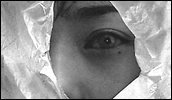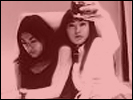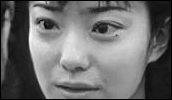Tomie
- Year
- 1998
- Original title
- Tomie
- Japanese title
- 富江
- Director
- Cast
- Running time
- 95 minutes
- Published
- 24 April 2001



by Jasper Sharp
The late-90s wave of stylishly creepy and consistently effective chillers from Japan such as Kiyoshi Kurosawa's Cure (1997), Hideo Nakata's Ring (1998) and Takashi Miike's Audition (1999) have come as quite a godsend for horror fans. Done well (which admittedly happens fairly seldom nowadays), horror is perhaps the purest and most expressionistic cinematic genre that exists in terms of its direct, almost transcendental appeal to the viewer's emotions, and also a medium which gives the director as much leeway as possible to bring his technical abilities to the fore.
For too long however has the genre allowed itself to become ever more reductive and reliant on its own cinematic traditions (or clichés, if you will) in its attempts to keep audiences on the edge of their seats, becoming increasingly self-referential until for one minute it looked like Wes Craven's Scream franchise had just about killed the genre off for good. The most interesting thing about this New Wave from the East is that, yes, there are a lot of elements lifted from western films, but at the same time the individual works themselves do not slavishly adhere to the rigid plot templates which recent Hollywood 'post-modern' offerings have cynically honed down ad absurdum in their attempt to ironically distance themselves from their own fantasies by not taking themselves seriously as anything more than mere entertainment, a laugh and a scream for 90 minutes. The Japanese at least seem to have remembered that horror can still offer a rich thematic seam through which to explore various ideas, provoke thoughts, and still scare the shit out of you.
Based on the manga series by Junji Ito and scripted and directed by Ataru Oikawa (who had previously worked with Kiyoshi Kurosawa in a scriptwriting capacity as well as directing The Boy Made in Japan / Nippon-sei Shonen in 1995), Tomie is yet another respectable addition to this canon of recent Japanese horrors. High school student Tsukiko (played by the Tokyo Trash Baby herself, the wonderful Mami Nakamura) is being treated for amnesia by psychiatrist Tatsuko (Yoriko Douguchi) and plagued by violent dreams subsequent to the death of her best friend Tomie Kawakami (Miho Kanno, 'talento' starlet of Wizard of Darkness / Eko Eko Azaraku, 1995). Investigator Shoji Harada (played by Tomorowo Taguchi, an actor whose résumé runs respectably through some of the most significant Japanese films of the past 15 years, from Shinya Tsukamoto's Tetsuo: The Iron Man and Shunji Iwai's Swallowtail Butterfly to Shohei Imamura's The Eel) has traced back a long line of corpses going by the name of Tomie Kawakami stretching right back to the Meiji period, all slaughtered and decapitated before they reach womanhood by jealous boyfriends who subsequently commit suicide. And that creepy kid with a gammy eye in the downstairs apartment seems to be keeping something suspicious in a little cardboard box - something which rapidly begins to grow into the form of a little girl... called Tomie!
Similar to The Ring and Shikoku, Tomie takes the traditional scenario of the vengeful female ghost, who in this case is able to reincarnate from generation to generation via her bloody severed leftovers, and warps it into an ingenious premise that at times almost seems like a rather conservative kickback against feminine emancipation (at one point Tomie points out to her friend that she'll never be old and married). Stylistically it also owes a lot to western horrors, the most obvious nod being to the slick grotesquerie of Italian horror-meister Dario Argento, with its long POV tracking shots, disingenuous editing, coloured spot-lighting, and a soundtrack which alternates between moments of exaggerated background noise and a vocoded electronic soundtrack (courtesy of Hiroshi Futami) reminiscent of the Goblin scores for Tenebre (1982). Several shots almost seem to be directly lifted from Argento's work, most notably a bathtub drowning scene harking back to Deep Red or Mario Bava's seminal giallo, Blood and Black Lace (1964), and the shots of a solitary eye staring through a ripped sheet recalling Tenebre. There's also the same pre-occupation with pretty young girls, wide-eyed in terror being menaced by long phallic-looking sharp objects.
Fortunately, Oikawa never lets the intriguing drama elicited by the Death-Desire drive embodied in the central character play second fiddle to the effective suspense set pieces. The characters are all strongly drawn, with Nakamura (who debuted in the succinctly titled domestic drama Father Fucker, a.k.a. The Girl of Silence in 1995) making for an especially effective heroine. My only complaint here is with the usual half-hearted handling of the VCD presentation, which renders the poorly translated subtitles virtually unreadable against the background for a good proportion of the time (far too many scenes in the psychiatrist's office, if you catch my drift). Still, within the confines of a major studio horror, Tomie is good solid viewing, well scripted, well made, and well worth a view.
A more graphic and by all accounts superior sequel, Tomie - Replay followed in 2000, with Fujiro Mitsuishi helming the directorial duties, which was released on a double bill with Uzumaki (directed by Akihiro "Higuchinsky" Higuchi). And if further proof was needed of Tomie's regenerative powers, Tomie Re-Birth (directed by Takashi Shimizu) was launched upon a perhaps not so unsuspecting public in early 2001.